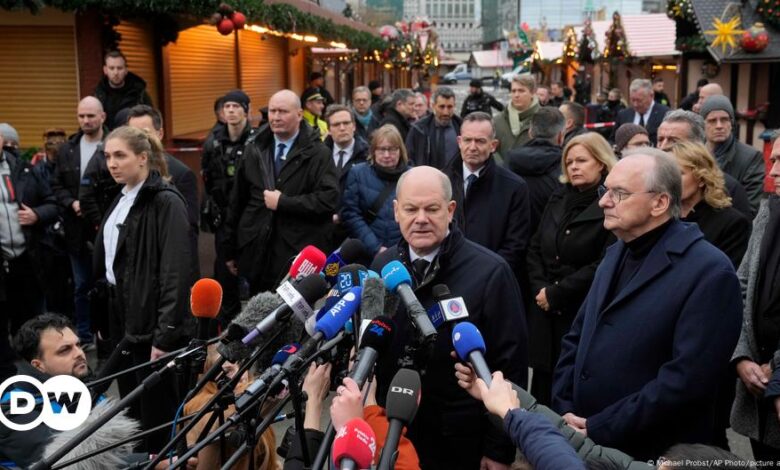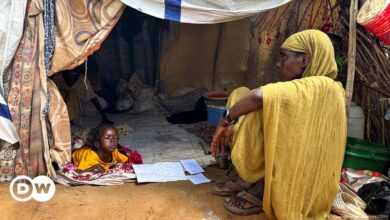Germany: Magdeburg attack could shape upcoming elections – DW – 12/22/2024

The first efforts to instrumentalize Friday’s deadly ramming of the Magdeburg Christmas market came less than an hour after the attack. False rumours circulated that there were five attackers, three of whom were still on the loose, that they had arrived in Germany as refugees from Syria in 2015 and 2016, and that it wasn’t just a car that had killed at least 34 people, but a bomb placed at the site of the holiday festivities.
Austrian nationalist Martin Sellner, a leading figure in European Identitarian networks, was one of the most prominent spreaders of the disinformation. Politicians from the far-right Alternative for Germany (AfD) soon joined in the efforts to capitalize on the attack, in which at least five people were killed by a suspect identified as Talib A.*, a Saudi citizen who has lived in Germany since 2006 and has apparently expressed admiration for the AfD.
“Only the AfD would have deported the man long ago,” Sven Tritschler, the deputy chairman of the AfD in the state parliament of North Rhine-Westphalia, posted to social media.
Dominik Kaufner, an AfD member of the Brandenburg state legislature, posted to social media that “millionfold migration is the problem and millionfold remigration is the solution.”
In her own post, AfD member of the state parliament in Lower Saxony, Vanessa Behrendt, blamed rival German parties such as the center-left Social Democrats (SPD), the center-right Christian Democrats (CDU), Greens and the Left Party: “They are responsible for this. They alone.”
‘Right-wing narratives spread’
With an eye on federal elections scheduled for February, AfD leader Alice Weidel, the party’s candidate for the chancellorship, wrote on social media: “When will this madness come to an end?”
Benjamin Höhne, a political scientist at the Technical University in Chemnitz, whose research focuses on German parties, told DW: “The trend is going more and more to the right. Right-wing narratives spread. An open migration policy that attempts to recognize global human rights has already fallen out of favor. Catastrophic events such as what happened in Magdeburg will likely exacerbate that.”
The German news agency dpa has reported that the government of Saudi Arabia had previously tipped off German officials that the suspect, a vocal dissident, could be a threat. The pro-Russia Sahra Wagenknecht Alliance (BSW), which also campaigns on restrictive migration policies, has lashed out at German Interior Minister Nancy Faeser, saying she must answer “why so many tips and warnings were ignored” ahead of Friday’s attack.
Noting recent fatal knife attacks in the cities of Solingen and Mannheim, BSW leader Sarha Wagenknecht called for “a convincing security plan with a clear focus on the protection of the population.”
Höhne said: “It is to be expected that parties, especially on the right, will attempt to attack the interior minister and the SPD on the topic of security. The SPD has responsibility for the Interior Ministry and domestic security on the federal level, so it will try not to end up on the defensive because of Magdeburg.”
Germany’s looming federal elections
Historically, the CDU and its Bavarian sister party the Christian Social Union (CSU) have been the parties that have positioned themselves as stronger when it comes to domestic security. Höhne said it was likely that security and migration would be at the center of debates in the coming campaign, as they had been in recent state elections in eastern Germany.
There is an increasing emphasis on “securitization” in German politics, according to Höhne. “That means that migration is almost exclusively discussed as a potential or actual security risk,” he said. “With that, other facets of migration are pushed to the background — such as, for example, how to address Germany’s labor shortage or attract skilled workers. I fear that the attack in Magdeburg will further strengthen this bias.”
There are also efforts by foreign actors to influence German elections. Along with Russian disinformation, US-based tech billionaire Elon Musk has attacked Germany’s government. An ally of US President-elect Donald Trump’s and the owner of the social network X, Musk has already endorsed the AfD in the coming elections. Shortly after the attack in Magdeburg, he demanded that German Chancellor Olaf Scholz stepped down, calling him an “incompetent fool.”
“Government institutions and officials should consider whether their continued presence on X is politically advisable. It should be clear that Elon Musk is using his company X to push his political agenda in Germany. German federal government institutions shouldn’t tolerate it,” Höhne said.
This article was originally written in German.
*Editor’s note: DW follows the German press code, which stresses the importance of protecting the privacy of suspected criminals or victims and urges us to refrain from revealing the full names of alleged criminals.




